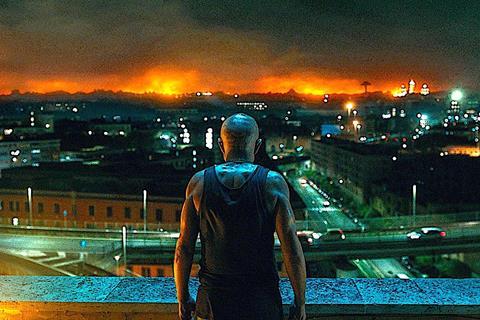Pierfrancesco Favino and Toni Servillo play two ageing mob-men in the final part of Stefano Sollima’s Rome-set crime trilogy

Dir: Stefano Sollima. Italy. 2023. 127mins
Strip the neo-noir style and attitude away from Stefano Sollima’s latest, and you get a not particularly original tale of three corrupt cops searching for a scared kid who knows too much about their scams. But there is one very attractive bonus, aside from the moody Roman settings: the casting of Pierfrancesco Favino and Toni Servillo as two elderly mobsters who were once alpha males in the Roman criminal underworld. In parts tailored to their talents, Adagio sees both actors outdo themselves in getting under the wrinkled, leathery skin of these ravaged but still menacing men, dormant volcanoes just waiting to explode. Sure, Favino and Servillo are not quite such household names abroad as they are in Italy, but their gnarly, physical performances speak for themselves.
Sollima’s latest slice of urban noir is a pressure cooker from which there is no escape
With Sicario: Day Of The Soldado and Without Remorse, Sollima showed he could manage US action fare, but there was a distinct sense that he was a director for hire. Adagio is unmistakably his. While snacking on his TV work (Gomorrah, ZeroZeroZero), Sollima aficionados have been waiting eight years for the director to return to the subject that seems to bring out the best in him – his native city. Sure, the film has a few faults aside from its clichéd story, among them a backdrop of fires raging out of control on the edge of town that feels like dystopian window dressing. It should nevertheless be embraced by global audiences with an appetite for classy Italian genre fare, at least those prepared to accept that a homophobic undercurrent is justified by the fact that Adagio is about a culture of toxic Roman masculinity.
The film is billed as the third and final part of a Rome trilogy that began in 2012 with ACAB and continued with Suburra in 2015. At one point, asked if he committed a particularly nasty crime, one of Suburra’s gangland bosses replied “Rome did it”. In Adagio, Rome does it again. Far from the tourist clichés, the ancient, decaying conurbation is a pressure cooker from which there is no escape. This is an Eternal City which feels like it might end tomorrow. Cheap apartment blocks back into ancient aqueducts, and washing is hung out to dry a few meters from the incessant traffic on a flyover. Grilles and gates keep characters pent in, while dirty windows are placed high up, letting a submarine light in to apartments where cheap fans whirr.
Gianmarco Franchini plays Manuel, a sensitive young rapper and small time drug dealer who is caught working as a male prostitute by a trio of corrupt policemen, and forced to act as their clandestine cameraman at a decadent party thrown by a cross-dressing politician. But the blackmail video is put on hold when Manuel flees the party, alarmed when he discovers a hidden camera. No matter that any smart kid would assume that this surveillance camera and the mission he has been given are connected. All we need to know is that he is frightened, and the cops who employed him are now pursuing him.
Manuel’s first port of call is Valerio Mastandrea’s ‘Pol Niuman’ (Roman dialect for ‘Paul Newman’) an old guy who was once a major player in Rome’s Banda della Magliana, a criminal gang that was big in the 1980s. Manuel’s dad, ‘Daytona’ (Servillo), was also one of the Magliana big cheeses, as was Romeo, a.k.a. ‘The Camel’ (Favino). All three are ruined wrecks: Pol Niuman is blind, Daytona is no longer all there, while Romeo has cancer.
So much for the ropey plot; Adagio is more interested in the inner life of its characters. Just after he has been punctured by a gunshot and patched up again, Adriano Giannini’s policeman is on the phone to his eldest son, negotiating TV timefor the evening. Waiting for the lift at Romeo’s, Manuel is lumped with the job of carrying an old Roman matron’s shopping cart upstairs. Daytona’s mental vagueness comes and goes, seemingly at will; one minute he is throwing his sandal at a pigeon on a pedestrian crossing, the next he appears from out of nowhere, knife in hand, in the cop car that was trailing him.
But it is Favino’s Romeo who is Adagio’s most memorable character, not to mention its most impressive transformation (this is a film that lists not one but two ‘ageing’ operatives in its end credits). He’s a crumbling Hercules, bald and stooped, lying in a foetal position on the floor beneath the bed of his former lover in a vain attempt to escape the Roman heat and humidity, but still capable of moments of bull-like strength and ferocity.
Production companies: The Apartment, Alter Ego, Vision Distribution
International sales: Vision Distribution, info@visiondistribution.it
Producers: Lorenzo Mieli, Stefano Sollima
Screenplay: Stefano Bises, Stefano Sollima
Production design: Paki Meduri
Editing: Matthew Newman
Cinematography: Paolo Carnera
Music: Subsonica
Cast: Pierfrancesco Favino, Toni Servillo, Valerio Mastandrea, Adriano Giannini, Gianmarco Franchini, Francesco Di Leva, Lorenzo Adorni, Silvia Salvatori






![The Brightest SunScreen[Courtesy HKIFF]](https://d1nslcd7m2225b.cloudfront.net/Pictures/274x183/3/5/0/1448350_thebrightestsunscreencourtesyhkiff_312678.jpg)














